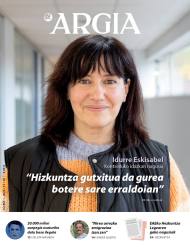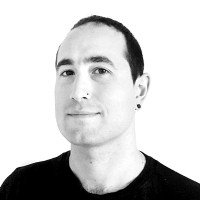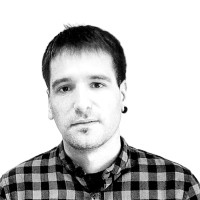An identity of congratulations
This year we have been given a hand to the Basques from the distant past and we have taken it with a vote, because we have seen our identity in the place we have read in Sorioneku. We were here, therefore, for two thousand years and we have thought so before. Archaeology and Linguistics have helped clarify this distant past of the Basque community, and so we have learned that in the 1st century before Christ, when the first attacks of the Roman legions extended to the Basque camps, the inhabitants of the territory they called ager vasconum had their own language, proto-Basque, and wrote it in an adapted alphabet, composed of Iberian signs.
Right away we have drawn a long bridge in the collective imaginary, in a house of the Vascones of Irulegi we have seen hanging the bronze hand, wishing happiness, and until this Christmas eve we get to the idea that we are part of it. And it is at that moment that inevitably the question arises: how has this Basque community of today been reached, in this abrupt path of thousands of years?
We know from history that our people in Irulegi were attacked by the Roman army in the so-called Sertorian war, destroying and burning their homes. Thus the Roman pax was established in the Basque territories. From then on, the invasions of foreign armies are recorded in a long list of Germanic, Arab, French, British, Normans, Castellanos, Nazis, Spanish countries… But until now the colonizing stories of our country have written to us, obscuring the identity of the rebels: who were those V-century Bagauds? Who and how did they fight the Franks? How and why did the so-called wars of older relatives favor the pre-eminence and invasion of Castile? What was really behind the witch hunt organized in Euskal Herria by the Spanish and French crowns in the 16th century?
"If history is science, we must approach it from the Basque Country itself when the Basque community is the object and principal subject of that science"
If history is science, we must work this science from the Basque Country itself, when the Basque community is the main object and subject of it. We can't make lights in that two-thousand year old black hole.
The same occurs in the sections of Sociology and Sociolinguistics. In order to understand the preponderance of Spanish and French in the Basque Country today, in order to know and scientifically revolutionize the path from one's own language to the phase they have called bilingualism and from there to the substitution of one's own language and to loss, it is necessary to prioritize the discourse of scientific Sociolinguistics instead of the official assimilationist fabulation today.
From the sociology of culture we have to learn how to shape the Cultural Polysystem that Basque culture needs to live, how to organize it, taking as its axis the Basque Country, our education, our communication systems, the labor world, administration and politics, art, leisure, sport… Our own nation in all its diversity and complexity in this world today.
The Basques also need Political Science, not to believe the fable of a lehendakari, when he says that “independence is from the 19th century and not from today.” Scientific data tell us, for example, that from 1975 to 2022, 49 independent states have been created, five of them in this 21st century. That at the moment there are peoples of Europe who look like us.
The Basque community and the Basque community have been preserved in the last two thousand years for our fortunate Basque identity, and science will open the way to the Basque nation.
Bidali zure iritzi artikuluak iritzia@argia.eus helbide elektronikora
ARGIAk ez du zertan bat etorri artikuluen edukiarekin. Idatzien gehienezko luzera 4.500 karakterekoa da (espazioak barne). Idazkera aldetik gutxieneko zuzentasun bat beharrezkoa da: batetik, ARGIAk ezin du hartu zuzenketa sakona egiteko lanik; bestetik, egitekotan edukia nahi gabe aldatzeko arriskua dago. ARGIAk azaleko zuzenketak edo moldaketak egingo dizkie artikuluei, behar izanez gero.
Sare Herritarrak antolatuta, pasa den urtarrilaren 11n Bilboko kaleak bete zituen manifestazio jendetsuaren ondoren, berriz sortu da eztabaida, euskal presoei salbuespen legeriarik aplikatzen ote zaion. Gure iritzia azaltzen saiatuko gara.
Espetxe politikan aldaketa nabarmena... [+]
Duela gutxi think tank izateko jaioa omen den Zedarriak bere 6. txostena aurkeztu zuen. Beren web orrialdean azaltzen dutenaren arabera, zedarriak ebidentea ez den bidea topatzeko erreferentziak dira. Hots, hiru probintzietako jendarteari bidea markatzeko ekimena. Agerraldi... [+]
The time has come for us to enrol in schools in the Basque Country for the 2025-26 academic year, and in many homes the youngest of the household will take a new step soon, in September, which is schooling. Proud of the Basque Public School The members of Topagune are firmly... [+]
Since the adoption of the new Education Law for Álava, Bizkaia and Gipuzkoa, we are hearing/reading again and again that education will be free from now on. We have listened to different actors, including the Department of Education, and in the interviews we offer to the media,... [+]
At the beginning of the month he did III. Congress in Pamplona. It is said to be the “ordinary congress” that serves to draw “non-ordinary conclusions”, or at least that is how they have received Zutunik in the paper, proposed by the leadership and unanimously approved... [+]
There are many ways to gain power; not all are beautiful. There are those who want to divide the power and the responsibility that it entails with it, who seek authority. Others have a lot of respect for him and the fact that each step is so measured makes them unable to make a... [+]
A conference for architects has just been held in Madrid to discuss the crisis of the professional architect. They have distinguished the traditional and contemporary way of being an architect. What is traditional? From the epic architect who appears in The Brutalist, where... [+]
On February 3rd, the time has begun to pre-enroll our children and young people in schools, and as every year we would like to remind you why we do not think it is a good idea to enroll them in religion. Last year we finished the article saying that “many of you will be... [+]
From the Association of Parents of the Instituto Arratia Small Tram we want to encourage reflection on the use of screens in the learning community.
Lately there is a lot of concern about the impact of screens on children and adolescents. This responsibility extends from... [+]
Bai, bai, holaxe. Ez naiz harago joatera menturatzen. Pleonasmo bat dela? Tautologia bat agian? Baliteke, baina egia-oste deitzen dioten garai honetan, oinarri-oinarrizko egitateak beharrezkoak dira. Begira, bestela, “Ez da ez!” lelo indartsuari. Bagenekien hori... [+]
I had a friend who worked at Porcelana Irabia until they closed, and every time we went to a restaurant or a bar he looked at the mug and the ass of the dish to find out where the piece was made. I do the same thing when I go to the fairs of old things: I look where it is made,... [+]
Azken boladan gero eta gehiago entzuten dugu gazte askok etxebizitza erosteko ahalmenik ez dugula. Batzuetan, badirudi ez dagoela beste gairik; egia da gai serioa dela. Niri neuri ere, 31 gertu izan arren, oraindik pixka bat falta zait neurea izango den etxebizitza lortzeko... [+]
An ad jumps on my mobile in a long time. He promises to color my world. They say that with this app I will be able to buy like the millionaires. Cheap products, very cheap, even free. They have played on the marketing target that the sociological historical moment demands. This... [+]
There are concepts that appear everywhere during certain periods, which also become mantras. They appear to us in a positive and necessary way, without too much debate and without thinking about them. It seems to me that one of these mantras is internationalization, which has... [+]


















